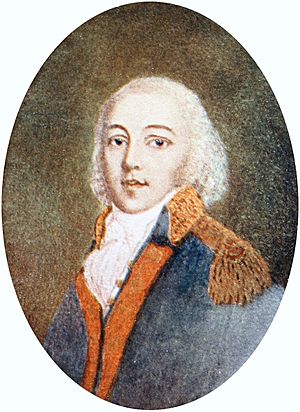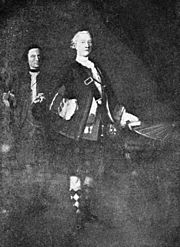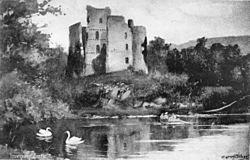Angus McDonald (Virginia militiaman) facts for kids
Quick facts for kids
Angus McDonald
|
|
|---|---|

Portrait of Angus McDonald
|
|
| Born | 1727 Scottish Highlands, Scotland, Kingdom of Great Britain |
| Died | August 19, 1778 (aged 50–51) "Glengarry" near Winchester, Virginia, United States |
| Allegiance | |
| Service/ |
Virginia provincial militia |
| Years of service | 1745–1746 (Jacobites) 1746–1776 (Great Britain) 1776–1778 (United States) |
| Rank | Lieutenant colonel |
| Battles/wars | Jacobite rising of 1745 French and Indian War Dunmore's War American Revolutionary War |
| Spouse(s) | Anna Thompson |
| Relations | Anna Thompson (spouse) Angus McDonald (son) Angus William McDonald (grandson) Marshall McDonald (great-grandson) |
| Other work | Military officer, frontiersman, sheriff, landowner |
Angus McDonald (1727 – August 19, 1778) was an important Scottish American military officer, frontiersman, sheriff, and landowner in Virginia.
He fought as a young lieutenant in the Jacobite rising of 1745 in Scotland. After this, he was accused of a serious crime against the king. He then left Scotland for the Colony of Virginia in 1746 when he was 18.
In Virginia, McDonald first worked as a merchant for a few years. Later, he joined the colonial government's military. He became a captain and fought in the French and Indian War. After this war, he retired in 1763.
In 1765, McDonald returned to military service. He became a major in charge of the Frederick County militia. He also worked as an attorney and land agent for Lord Fairfax.
In 1774, Governor John Murray, 4th Earl of Dunmore asked McDonald to lead an expedition. This mission, called "McDonald's Expedition," aimed to protect settlers west of the Allegheny Mountains from Native American attacks. McDonald successfully completed this mission.
During the American Revolutionary War, General George Washington appointed McDonald as a lieutenant colonel. McDonald served in Virginia's revolutionary militia forces. He also worked on various committees during the war.
Contents
Early Life in Scotland
Angus McDonald was born in 1727 in the Scottish Highlands. His family was part of the Clan MacDonell of Glengarry. This clan's main home was Invergarry Castle. Angus was likely the son of another Angus McDonald. This elder Angus was a younger son of Alastair Dubh MacDonell, a famous clan leader.
Angus McDonald was raised and went to school in Glasgow. When he was 18, he fought as a lieutenant in the Jacobite rising of 1745. He fought under Charles Edward Stuart in the Battle of Culloden. After this battle, he was accused of a serious crime against the king. He then fled Scotland in 1746, sailing from Inverness to the Colony of Virginia.
Military Service in Colonial Virginia
Starting His Career
McDonald arrived in Virginia at the port of Falmouth. He brought some special items with him. These included a short sword, sash, and a metal plate (gorget) with his clan's coat of arms. He had worn these at the Battle of Culloden. For about two or three years, McDonald worked as a merchant in Falmouth.
He then moved west into Virginia's inner lands. He joined the military service of the colonial government. He became a captain under Lieutenant Governor Robert Dinwiddie. In 1754, he received 400 acres (1.6 km2) of land. This was a reward for his good service in conflicts against Native Americans. Around that time, McDonald moved further west to Winchester. There, he helped start the first Masonic Lodge in 1760. He also served on the Committee of Safety in Winchester.

French and Indian War
McDonald served in the French and Indian War under General John Forbes. He commanded a company of Scottish Highlanders. In the autumn of 1758, McDonald and his company marched against Fort Duquesne. After the war, McDonald retired as a captain in 1763.
Upon his retirement, Governor John Murray, 4th Earl of Dunmore gave McDonald an extra 2,000 acres (8.1 km2) of land. Before this, in 1762, McDonald bought 370 acres (1.5 km2) of land east of Winchester. He built his family home there and named it Glengarry. This name honored his family's homeland in Scotland.
In 1765, McDonald returned to military service. Thomas Fairfax, 6th Lord Fairfax of Cameron made him a major. He commanded the Frederick County militia. Lord Fairfax also appointed McDonald as an attorney and land agent for his large land holdings. By 1769, McDonald was a magistrate (a type of judge) for the Frederick County court. He served with other important people like Lord Fairfax and Samuel Washington, who was George Washington's brother.

McDonald's Expedition and Dunmore's War
In early 1774, McDonald took part in an expedition to survey lands. These lands along the Ohio and Kanawha rivers were to be given to soldiers. The expedition was cut short because of conflicts with Native Americans. McDonald reported these problems to Lord Dunmore. These reports led Lord Dunmore to start a war against Native Americans. The goal was to make the western Virginia frontier safer for settlers.
In June 1774, Lord Dunmore asked McDonald to lead another expedition. This mission, called "McDonald's Expedition," aimed to quickly gather settlers west of the Allegheny Mountains. Their goal was to defend European American settlements from Native American attacks. McDonald's forces, along with Captain Michael Cresap's, totaled about 400 men.
They built Fort Fincastle in July 1774. McDonald's forces then marched toward the Shawnee villages of Wakatomika. They faced an ambush about 6 miles (9.7 km) from Wakatomika. Two soldiers died and several were wounded. McDonald's forces reached the Muskingum River on August 2, 1774. They found the main Wakatomika town empty. The Shawnee had planned another ambush but surrendered for peace. McDonald's forces continued, burning Shawnee cabins and destroying their crops. They killed three Shawnee and took one prisoner.
McDonald returned to Wheeling with three Shawnee tribal chiefs as captives. They were sent to Williamsburg, the colonial capital. McDonald's expedition successfully helped protect western Virginia settlements for a time. He continued to serve under Lord Dunmore until the war ended. In December 1774, McDonald was promoted to lieutenant colonel.
On August 6, 1776, McDonald became the sheriff and justice of Frederick County. As sheriff, he commanded the militias of both Augusta and Frederick counties. These two counties covered a large part of Virginia at that time.
American Revolutionary War Service
When the American Revolution began, McDonald strongly supported the American cause. In March 1777, General George Washington sent McDonald a personal letter. Washington appointed him a lieutenant colonel in a battalion. This battalion was under the command of Colonel Charles Mynn Thruston.
McDonald refused this appointment. One reason was that he would have been second-in-command to a colonel who had less military experience than him. Also, McDonald had a past disagreement with Thruston. General Adam Stephen wrote to McDonald, urging him to accept. Stephen told McDonald not to let his "Highland pride" stop him from serving.
Later, Washington appointed McDonald again. This time, McDonald served as a lieutenant colonel. He commanded Virginia revolutionary militia forces during the American Revolutionary War. He also served on various committees during the war. McDonald died on August 19, 1778, at his home near Winchester. He passed away after receiving an incorrect dose of medicine.
Legacy
An article in the Winchester Star in 1967 described McDonald. It said he "founded in the Shenandoah Valley a dynasty of military men." This means his family continued to produce distinguished military leaders. The Wisconsin Historical Society noted that McDonald was a strong leader. He was also very strict with his troops.
Family Life
McDonald married Anna Thompson (1748 – about 1832) on June 20, 1766. Anna was from Hancock, Maryland. Her mother's family, the Eltinges, were of Dutch descent. Angus and Anna McDonald had seven children: four sons and three daughters.
- Mary McDonald Langham (May 9, 1767 – ?)
- John McDonald (August 19, 1768 – about 1837)
- Angus McDonald (December 30, 1769 – October 14, 1814)
- Eleanor McDonald Tidball (September 5, 1771 – ?)
- Anna McDonald Holliday (June 25, 1773 – ?)
- Thompson McDonald (March 29, 1776 – July 31, 1822)
- Charles McDonald (April 28, 1778 – died as a baby)
See Also
- Angus McDonald (United States Army major)
- Angus William McDonald
- Marshall McDonald
Images for kids
 | Sharif Bey |
 | Hale Woodruff |
 | Richmond Barthé |
 | Purvis Young |


